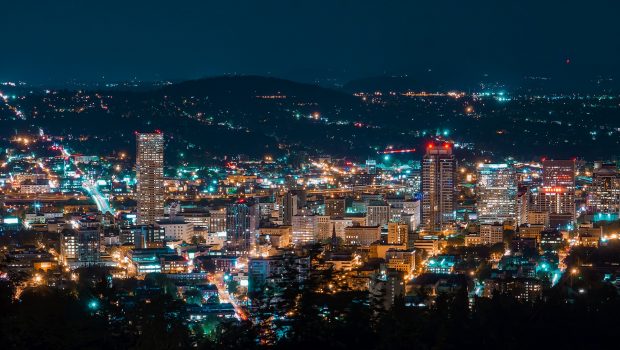Traffic signal technology tapped to reduce congestion in Portland’s metro area
A 2020 survey of traffic congestion in cities around the globe ranked Portland, Ore., as the 14th worst metro area in the nation and 115th worst in the world. That year, commuters lost 27 hours stuck in traffic.
The latest push to reduce that commute time by TriMet, the region’s mass transit service, will bring in software that can automatically control traffic signals to prioritize bus travel, and improve timing and reliability for transit riders.
“If you ever wanted to zip down a road with a string of green lights clearing your way, then TriMet’s Division Transit Project will be a wish fulfilled. Faster, smarter and more reliable bus service is coming Sept. 18 with the culmination of the Division Transit Project,” reads a news brief from the organization. “One reason for that will be a first for our region: the ‘next generation’ of what’s known as transit signal priority.”
The regional transportation service is partnering with cloud-based technology business LYT to deploy its Transit Signal Priority software as a part of that solution. Silicon Valley-based LYT serves municipalities across the U.S., and was selected based on the organization’s “technology and expertise,” according to A.J. O’Conner, director of intelligent transportation systems at TriMet.
“By moving buses faster and more efficiently, our riders will be able to rely on TriMet buses more and ultimately more people will have the confidence to get on board,” he said.
Besides the software, the initiative will launch buses much longer than those currently in use— accommodating 60 percent more riders— with multiple-door boarding for faster stops and expanded bus stations that are protected from the weather. Plans are also in the works to extend the service’s Red Line to serve 10 more stations in Beaverton and Hillsboro (a $215 million project that includes a $99.9 million grant from the Federal Transit Administration and other partners).
TriMet estimates the improvements will improve congestion and “reduce travel times up to 20 percent, with buses running every 12 minutes and more often during peak hours,” according to a statement.
The Transit Signal Priority system will be installed between downtown Portland, east Portland and the suburb of Gresham. The technology, which is currently installed in 58 intersections, links traffic signal sensors to machine learning and artificial intelligence, tapping into what’s happening at the street level and making signals operate more efficiently and smarter.
“Our goal is to improve the way people move through our cities while improving safety and reducing congestion for communities,” said Timothy Menard, founder and CEO of LYT. The software will help the transit organization by leveraging “artificial intelligence, machine learning technologies, and real-time information and analytics to improve the intelligence of their operation, benefitting travelers and residents alike.”








Gloss